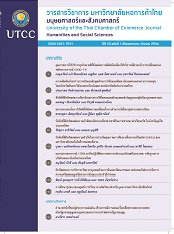Effect of Globalization on Income Inequality in ASEAN Countries
Main Article Content
Abstract
This research aims to analyze the effect of globalization on income inequality in 9 ASEAN countries: Thailand, Malaysia, Indonesia, Philippines, Singapore, Vietnam, Laos, Cambodia, and Myanmar between the years 2007 to 2019. This research also considers different types of globalization, namely, economic globalization, social globalization, and political globalization. The panel data Fixed Effect estimation used in the study finds that the overall, economic, trade, social, and information globalization reduce the income inequality within ASEAN countries. However, economic globalization and financial globalization can increase income inequality in low-income countries.
Article Details

This work is licensed under a Creative Commons Attribution-NonCommercial-NoDerivatives 4.0 International License.
ลิขสิทธิ์ของบทความ
ผลงานที่ได้รับการตีพิมพ์ถือเป็นลิขสิทธิ์ของมหาวิทยาลัยหอการค้าไทย ห้ามมิให้นำเนื้อหา ทัศนะ หรือข้อคิดเห็นใด ๆ ของผลงานไปทำซ้ำ ดัดแปลง หรือเผยแพร่ ไม่ว่าทั้งหมดหรือบางส่วนโดยไม่ได้รับอนุญาตเป็นลายลักษณ์อักษรจากมหาวิทยาลัยหอการค้าไทยก่อน
References
ASEAN Secretariat. (2008). ASEAN economic community blueprint. Retrieved from https://www.asean.org/wp-content/uploads/images/archive/5187-10.pdf
ASEAN Secretariat. (2011). Master plan on ASEAN connectivity. Retrieved from https://www.usasean.org/system/files/downloads/MPAC.pdf
ASEAN Secretariat. (n.d.). ASEAN political-security community. Retrieved March 10, 2022, from
https://asean2019.go.th/en/abouts/ประชาคมการเมืองและความ/
Asteriou, D., Dimelis, S., & Moudatsou, A. (2014). Globalization and income inequality: A panel data econometric approach for the EU27 countries. Economic Modelling, 36, 592-599. doi:10.1016/j.econmod.2013.09.051
Bergh, A., & Nilsson, T. (2010). Do liberalization and globalization increase income inequality? European Journal of Political Economy, 26(4), 488-505. doi:10.1016/j.ejpoleco.2010.03.002
Çelik, S., & Basdas, U. (2010). How does globalization affect income inequality: A panel data analysis. International Advances in Economic Research, 16, 358-370.
Chakrabarti, A. (2000). Does trade cause inequality? Journal of Economic Development, 25(2), 1-21.
Das, M., & Mohapatra, S. (2003). Income Inequality: The aftermath of stock market liberalization in emerging markets. Journal of Empirical Finance, 10(1-2), 217-248. doi:10.1016/S0927-5398(02)00025-7
Dorn, F., Fuest, C., & Potrafke, N. (2018). Globalization and income inequality revisited. Retrieved from https://ec.europa.eu/info/sites/default/files/dp_056_en.pdf
Ezcurra, R., & Rodríguez-Pose, A. (2013). Does economic globalization affect regional inequality? A cross-country analysis. World Development, 52, 92-103. doi:10.1016/j.worlddev.2013.07.002
Georgantopoulos, A. G., & Tsamis, A. D. (2011). The impact of globalization on income distribution: The case of Hungary. Research Journal of International Studıes, 21, 17-25.
Gozgor, G., & Ranjan, P. (2017). Globalisation, inequality and redistribution: Theory and evidence. The World Economy, 40(12), 2704-2751. doi:10.1111/twec.12518
Gygli, S., Haelg, F., Potrafke, N., & Sturm, J.-E. (2019). The KOF globalisation index – Revisited. Review of International Organizations, 14(3), 543-574. external page doi:10.1007/s11558-019-09344-2
Hausman, J. A. (1978). Specification tests in econometrics. Econometrica, 46(6): 1251-1271. doi:10.2307/1913827
Heshmati, A. (2007). The relationship between income inequality, poverty and globalization. In M. Nissanke, & E. Thorbecke (Eds.), The impact of globalization on the world’s poor (pp. 59-93). London, England: Palgrave Macmillan.
Huh, H.-S., & Park, C.-Y. (2019). A new index of globalization: Measuring impacts of integration on economic growth and income inequality. Retrieved from https://www.adb.org/sites/default/files/publication/513856/ewp-587-new-index-globalization.pdf
International Monetary Fund. (2021). World economic outlook database. Retrieved April 10, 2022, from https://www.imf.org/en/Publications/SPROLLs/world-economic-outlookdatabases#sort=%40imfdate%20descending
Jaumotte, F., Lall, S., & Papageorgiou, C. (2013). Rising income inequality: Technology, or trade and financial globalization? IMF Economic Review, 61(2), 271–309.
Kharlamova, G., Stavytskyy, A., & Zarotiadis, G. (2018). The impact of technological changes on income inequality: the EU states case study. Journal of International Studies, 11(2), 76-94.
KOF Swiss Economic Institute. (2021). 2021 Globalisation index: Structure, variables and weights.Retrieved April 9, 2022, from https://ethz.ch/content/dam/ethz/special-interest/dual/kof dam/documents/Globalization/2021/KOFGI_2021_structure_19.pdf
Lee, C. C., Lee, C. C., & Lien, D. (2019). Income inequality, globalization, and country risk: A cross-country analysis. Technological and Economic Development of Economy, 26(2): 379–404. doi:10.3846/tede.2019.11414
Mohanty, S. (2017). Economic globalization and income inequality: Cross-country empirical evidence. Retrieved from http://www.isec.ac.in/WP%20391%20-%20Sovna%20Mohanty%20-%20Final.pdf
Munir, K., & Bukhari, M. (2019). Impact of globalization on income inequality in Asian emerging economies. International Journal of Sociology and Social Policy, 40(1/2), 44-57. doi:10.1108/IJSSP-08-2019-0167
Neutel, M., & Heshmati, A. (2006). Globalisation, inequality and poverty relationships: A cross country evidence. Retrieved from https://docs.iza.org/dp2223.pdf
Roser, M., & Cuaresma, J. C. (2016). Why is income inequality increasing in the developed world? The Review of Income and Wealth, 62(1), 1-27. doi:10.1111/roiw.12153
Tayebi, S. K., & Esfahani, S. O. (2009). Globalization and inequality in different economic blocks. Iranian Economic Review, 14(24), 135-151.
Tian, X., Wang, B., & Dayanandan, A. (2008). The impact of economic globalization on income distribution: Empirical evidence in China. Economics Bulletin, 4(35), 1-8.
Tica, J., Globan, T., & Arčabić, V. (2021). Managing the impact of globalization and technology on inequality. Economic Research-Ekonomska Istrazivanja, 35(1), 1035-1060. doi:10.1080/1331677X.2021.1952466
World Bank. (2018, July 1). New country classifications by income level: 2018-2019. Retrieved from https://blogs.worldbank.org/opendata/new-country-classifications-income-level-2018-2019
World Bank. (2021). Gini index. Retrieved April 9, 2022, from https://data.worldbank.org/indicator/SI.POV.GINI


